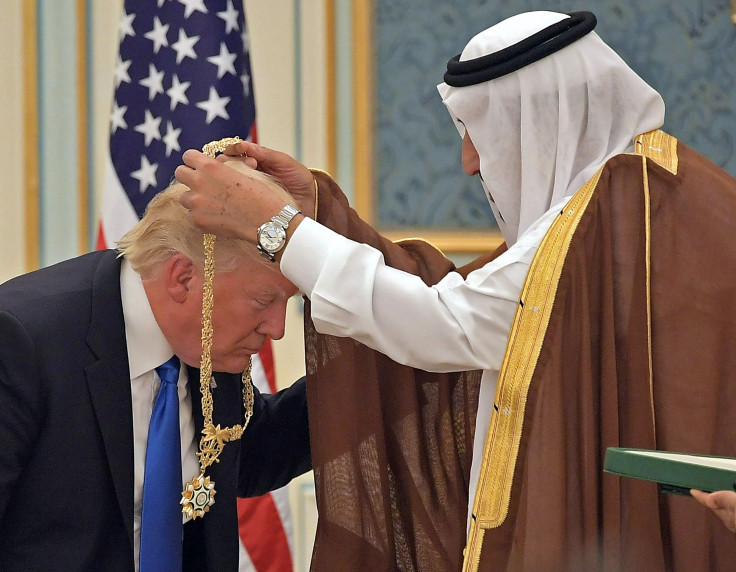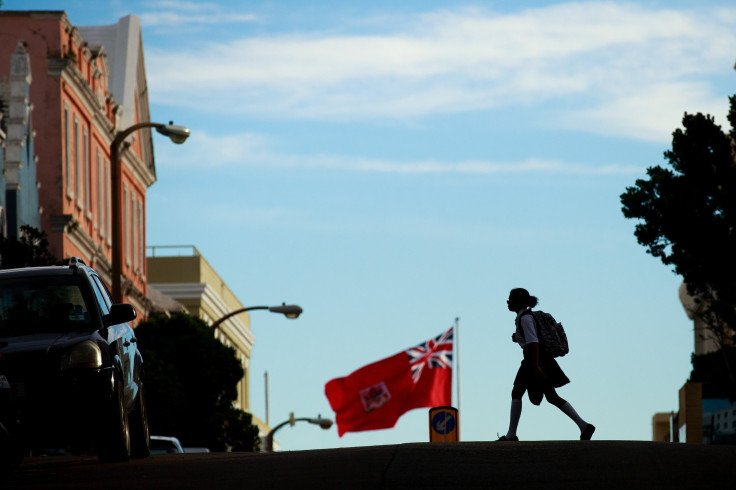Foreign Lobbyists Contributed More Than $4.5 Million to Candidates in 2016 Elections

This report is being co-published with MapLight.
Since Donald Trump won the presidency, concerns about whether Russia played a hidden role in the 2016 election have simmered, and lawmakers have warned about the prospect of stealth foreign influence over American politics. But data compiled by International Business Times and MapLight show that foreign influence is hardly confined to the shadows. It’s a big, open, bipartisan business, with foreign government lobbyists delivering millions of dollars of campaign cash to elected officials in Washington.
In all, during the last election, those lobbyists gave more than $4.5 million to federal lawmakers and candidates. Foreign lobbyists and their firms’ political action committees were also responsible for packaging a total of $5.9 million in donations for candidates and party committees, through an influence-enhancing tactic known as “bundling.”
Because the donations come from foreign governments’ U.S.-based lobbyists, they effectively circumvent American laws designed to bar direct foreign donations. Under federal law, foreign nationals are prohibited from donating to any federal, state, or local campaigns, or political parties. But foreign governments frequently hire U.S. citizens to represent their interests, and those people face no such contribution ban.
“I worry about foreign influence on our political system,” Larry Noble, general counsel at the nonpartisan Campaign Legal Center, told IBT/MapLight. “One of the things that recent events are highlighting is the porous nature of a lot of our laws and a lack of enforcement.”
Noble, a former Federal Election Commission lawyer, said that donations by foreign lobbyists don’t often come from the lobbying firms or their PACs, but from individual members of the firm.
“When that happens, how do you know whether any of that money is being directed by lobbyists of the foreign national, or if it's coming out of money they got from the foreign national for that purpose? There are lots of ways for people to get illegal money to campaigns,” Noble said. “It’s not an easy thing to prove.”
Top foreign lobbying firms have been ensnared by special counsel Robert Mueller’s investigation into alleged Russian influence on American elections. For instance: Mercury Public Affairs, a bipartisan lobbying firm, has been subpoenaed about its work with one-time Trump campaign chairman Paul Manafort on behalf of a Ukrainian political party allied with Russian president Vladimir Putin. Democratic lobbyist Tony Podesta — who is the brother of Hillary Clinton campaign chairman John Podesta — resigned from his lobbying firm after Mueller’s indictment of Manafort alluded to the firm’s work for the same Ukrainian interests. Lobbying records show Podesta’s firm was also hired to represent Sberbank, Russia’s largest bank.

Podesta — whose firm represented at least a dozen foreign clients during the 2016 cycle — was a major fundraiser for Democratic presidential nominee Hillary Clinton, the top 2016 recipient of money from foreign government lobbyists. Podesta said in an email that he has never been instructed by a foreign lobbying client to make donations to a U.S. campaign, and that he saw no ethical problem with foreign agents making political contributions.
Other top recipients include lawmakers in positions to shape foreign policy issues, including arms deals, tariffs and international tax policy. They include Senate Minority Leader Charles Schumer, D-N.Y.; Sen. Chris Van Hollen, D-Md., who serves on an appropriations subcommittee that oversees the State Department; Sen. Marco Rubio, R-Fla., who chairs a Senate foreign relations subcommittee; and House Speaker Paul Ryan, R-Wis.
The data compiled by IBT/MapLight represents campaign contributions from all donors registered under the Justice Department’s Foreign Registration Act (FARA). The figures, though, may represent only a portion of the total cash, since an unknown number of foreign agents never bother to register.
A Lucrative Business
Though there are potential criminal penalties for violating the registration law, the department possesses limited enforcement measures. The Justice Department’s inspector general found last year that 62 percent of foreign lobbyists fail to register on time, and reported that the agency “lacks a comprehensive FARA enforcement strategy.” The Manafort case spotlighted the registration gap: Among the federal charges against him was one for failing to disclose his work for the Ukrainian government.
Passed by Congress in 1938, FARA imposes registration requirements on “foreign principals,” which are defined as a foreign government or political party, any foreign national, and any “ partnership, association, corporation, organization, or other combination of persons organized under the laws of or having its principal place of business in a foreign country.”
Financed by the vast riches of dictators, multinational corporations and government treasuries, the business of representing foreign interests is a particularly lucrative subset of the Washington influence-peddling industry. FARA filings reviewed by IBT/MapLight show that an all-star cast of political power brokers has gone from serving the U.S. government to lobbying for foreign ones. They include 1996 Republican presidential candidate and former Senate Majority Leader Bob Dole, R-Kan.; former House Minority Leader Richard Gephardt, D-Mo.; former Senate Majority Leader Trent Lott, R-Miss.; and former Mississippi Republican Gov. Haley Barbour — as well as an army of former Capitol Hill staffers from both parties.

Clients range from political parties, like the Democratic Party of Albania, to corporations, such as Azerbaijan's state-owned oil company and a Polish government-sponsored consortium of defense contractors.
Contracts reviewed by IBT/MapLight show that politically connected lobbyists can make huge sums from foreign government clients — no matter how small, repressive, or impoverished the countries may be. Consider:
- The Sri Lankan government gave Democratic fundraiser Imaad Zuberi a four-month contract worth $8.5 million to do little more than provide “strategic advice related to commercial and public policy.” The contract with Zuberi — who raised hundreds of thousands of dollars for former President Barack Obama and Clinton — ended in 2014, but he did not file foreign agent registration forms until 2015, amid a Justice Department probe first reported by Foreign Policy.
- Cassidy and Associates, once described as “the most lucrative lobbying firm in Washington,” inked a $50,000-a-month contract in January with Egypt’s General Intelligence Service, which has been accused of manipulating elections and assisting in crackdowns on dissenters. The contract said the firm would “identify stakeholders who are supportive of the foreign principal's objectives” in the U.S. Foreign lobbyists at the firm delivered almost $60,000 to candidates in 2016.
- Nicaragua’s government inked a deal with legal powerhouse firm Akin Gump Strauss Hauer & Feld that promised a $350,000 payday if it could secure an extension of trade preferences that would help the country’s textile industry. The firm’s registered agents were the top source of political cash among all registered foreign lobbyists in the 2016 cycle, sending more than $390,000 to federal candidates. Akin Gump promised Nicaragua that its services would include “meeting and aggressive lobbying with key Members of Congress and officials of the Obama Administration.” One Akin Gump lobbyist who advised the Nicaraguan government previously served as an international trade counsel for the Senate Finance Committee. The firm’s lobbying efforts appear to have failed, as the tariff preferences expired and have not been renewed.
- The Podesta Group secured a $120,000-per-quarter contract to represent 7-year-old South Sudan, where the United Nations says 80 percent of the people earn less than $1 per day. The lobbyists have advised the young republic and represented them to the press, attempting to paint the government in a positive light, particularly around the anniversaries of the bloody civil war that has seen both government and opposition forces target specific ethnic groups.
- A firm called theGROUP was awarded a $20,000-a-month contract from Bermuda to push the government’s interests before Congress and the U.S. financial services industry, IBT reported. The deal was cemented in the same week that news organizations began publishing the Paradise Papers, a series on leaked documents detailing how the island nation has become a tax haven for politicians, celebrities and moguls across the globe. The company’s foreign agents, one of whom chairs the Congressional Black Caucus Institute's policy think tank, gave more than $90,000 to lawmakers during the 2016 election.
Saudi and Turkish Influence
Few foreign governments wield as much influence in Washington as Saudi Arabia. The Gulf monarchy employed about 20 lobbying firms during 2016 cycle. Employees of four of those firms — the Podesta Group, BGR Government Affairs, Brownstein Hyatt Farber Schreck, and the Glover Park Group — gave more than $580,000 to federal candidates.
Saudi lobbyists have worked to maintain U.S. logistical support for the kingdom’s war in Yemen, which has caused thousands of civilian deaths and famine. Brownstein, for instance, recently circulated talking points about Saudi Arabia's “humanitarian efforts in Yemen.”
While an increasing number of senators have criticized the Saudi offensive in Yemen — and have called for the U.S. to stop arming the Saudi military — the Pentagon has continued to supply weapons to the kingdom.
Lobbyists for the Saudis have questioned Iran’s compliance with the nuclear pact it brokered with the Obama administration, a deal that Trump recently moved to scrap. Schumer, the Senate minority leader, received at least $21,400 in donations linked to lobbying firms representing the Saudis from 2015-16, and was one of four Democratic votes against the 2015 deal.
The Turkish government has engaged four firms that were among 2016’s top foreign lobbyist donors: Capitol Counsel, Mercury, Glover Park Group, and the Daschle Group. The firms made at least $285,000 in political donations during the 2016 elections. Turkey’s lobbying efforts have revolved around Fethullah Gulen, a U.S.-based cleric blamed by the government for a failed coup attempt last summer against its president, Recep Tayyip Erdogan.
Mueller has been investigating allegations that include Turkey’s hiring of Gen. Michael Flynn, Trump’s former national security adviser, as part of a plot to kidnap Gulen and return him to Turkey. Flynn may have violated the law by failing to register under FARA or disclose his client’s link to Turkey, according to the House Oversight and Government Reform Committee. He pleaded guilty last week to lying to the FBI about his conversations with Russia’s ambassador to the U.S. Other lobbyists hired by Turkey have sought to persuade state politicians in Texas and Michigan to investigate a network of charter schools affiliated with Gulen.
Ashleigh McEvoy and Laura Curlin provided research for this report. Josh Keefe contributed reporting.
Click here to download the data.
Methodology: Contributions data consists of contributions to federal candidate campaign committees from Jan. 1, 2015, to Dec. 31, 2016, based on data from the FEC as of July 31, 2017. Contributions were matched with short-form registration records for active or recently terminated (since Jan.1, 2015) lobbyists from the U.S. Department of Justice as of July 14, 2017, by lobbyist name. Identifying contributions by contributor name may not capture all relevant contributions and may include false positives. Contribution bundling data is based on FEC filings as of Oct. 31, 2017.
© Copyright IBTimes 2024. All rights reserved.












